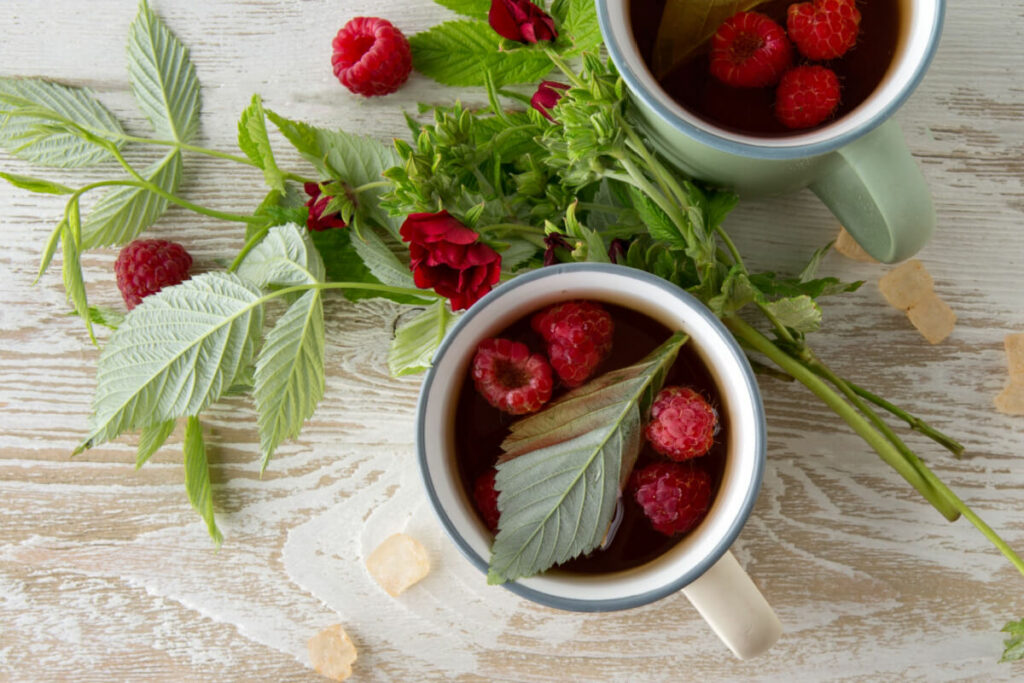A recent survey found that over one-third of individuals have taken red raspberry leaf while pregnant. (7) Red raspberry leaf is a herb most commonly used later in pregnancy to strengthen the uterus and encourage an easier delivery. (3)(10) But should you drink raspberry leaf tea? Read on to learn more about the potential benefits of drinking red raspberry leaf tea.

What is red raspberry leaf?
Red raspberry leaf is part of the raspberry plant, which belongs to the rose (Rosaceae) family. The red raspberry plant is native to parts of Asia and Europe and has grown wild for hundreds of years. The plant’s leaves were traditionally used as a herbal remedy thought to offer potential health benefits to pregnant people. Today, raspberry plants are farmed and continue to grow wild in many areas of the world. (4)
How can I consume red raspberry leaf?
Red raspberry leaves can be consumed as:
- Herbal supplements (e.g., capsules, tablets)
- Herbal teas (steeped or infused in hot water)
- Herbal tinctures (herbs extracted in alcohol) (3)
Always speak with your healthcare provider before consuming red raspberry leaf in any of its forms.
Red raspberry leaf tea is a common way to consume red raspberry leaves. Simply add boiling water to a cup with tea leaves and let steep for ten minutes before removing the leaves and consuming the tea. Because the tea is made from the leaves of the plant and not its berries, it doesn’t taste like berries or have a red color. (8)
Top red raspberry leaf benefits
Although the red berries of the raspberry plant are well known for their antioxidant properties, raspberry leaves also boast several impressive health benefits.
1. Provide bioactive compounds
Red raspberry leaves are rich in beneficial compounds primarily found in vegetables, fruits, leaves, and grains in small amounts. These compounds have the capability of modifying metabolic processes and affecting human health. (5) The two primary categories of bioactive compounds found in raspberry leaves are polyphenols and flavonoids. (6)(8)
The beneficial properties of raspberry leaves are mainly attributed to their hydrolysable tannins. Hydrolysable tannins are a type of flavonoid and a group of secondary plant metabolites (organic molecules produced by the plant) (14) that may have beneficial effects related to processes involved with oxidative stress, inflammation, and cancer. (1) Dried raspberry leaves contain approximately 2.6 to 6.9% hydrolysable tannins. (6)(8)
In addition to polyphenols and flavonoids, raspberry leaves also contain components such as phenolic acids, minerals (e.g., magnesium, zinc, iron), and vitamins (e.g., vitamin C). (6)(8)(10)
Did you know? Red raspberry leaf extract may be beneficial for improving symptoms involving mucus membranes, such as with oral lichen planus, a chronic inflammatory condition occurring inside the mouth. (15)
2. May be helpful during the third trimester of pregnancy
Is red raspberry leaf the key to an easier birth? Research is mixed.
Red raspberry leaf tea is often recommended to pregnant people in their third trimester, as the herb is believed to encourage labor and reduce complications during birth. In fact, according to one study, over half of midwives recommend red raspberry leaf to their pregnant patients. (11) It’s believed that red raspberry leaf might help encourage labor by increasing blood flow and strengthening and toning the uterus, potentially aiding contractions and reducing the risk of excessive bleeding postpartum. (3)(10)
However, there is limited compelling data demonstrating the benefits of consuming red raspberry leaf during pregnancy. Many studies have shown little to no significant benefit to using red raspberry leaf. The good news is that red raspberry leaf has a long history of use among pregnant individuals without causing any harmful effects, and it is likely safe when taken as directed by your midwife, obstetrician, or other providers involved in your prenatal care. (10)

3. May improve breast milk supply
If you’re breastfeeding, sipping on red raspberry leaf tea may help improve your milk supply. Red raspberry leaf is believed to be a galactagogue, which is defined as a food or drug that may promote or increase milk production. (9)(13) Although not fully understood, red raspberry leaf may boost milk production by encouraging a stronger milk ejection reflex. One review noted that individuals who used red raspberry leaf during pregnancy experienced a shorter time frame between delivery and the onset of milk production. (9)
Side effects of red raspberry leaf
Consuming red raspberry leaf in moderation is generally considered safe. (6) However, you should always speak with a healthcare professional first. For some, red raspberry leaf may lead to some gastrointestinal discomfort, particularly loose stools. (9) Considering that raspberry leaf tea is traditionally used to encourage contractions and aid labor, it’s recommended that pregnant people avoid consuming red raspberry leaf in the first and second trimesters. (2)(6)
The bottom line
Red raspberry leaf is a popular herb that’s commonly recommended to pregnant individuals later in their pregnancies—that’s because it’s believed to encourage contractions and lead to an easier delivery. This herb has long been promoted by midwives; however, current research is largely inconclusive and more research is needed. Red raspberry leaf is likely safe for low-risk pregnancies when taken during the third trimester; however, it may not be right for everyone. If you’re a patient, be sure to talk to your prenatal care provider before using red raspberry leaf.
- Amarowicz, R., & Janiak, M. (2016). Hydrolysable tannin. ScienceDirect. https://www.sciencedirect.com/topics/agricultural-and-biological-sciences/hydrolysable-tannin
- American Pregnancy Association. (2022). Herbal Tea and Pregnancy. https://americanpregnancy.org/healthy-pregnancy/is-it-safe/herbal-tea/
- Bowman, R., Taylor, J., Muggleton, S., & Davis, D. (2021). Biophysical effects, safety and efficacy of raspberry leaf use in pregnancy: a systematic integrative review. BMC Complementary Medicine and Therapies, 21(1). https://doi.org/10.1186/s12906-021-03230-4
- Burton-Freeman, B. M., Sandhu, A. K., & Edirisinghe, I. (2016). Red Raspberries and Their Bioactive Polyphenols: Cardiometabolic and Neuronal Health Links. Advances in Nutrition, 7(1), 44–65. https://doi.org/10.3945/an.115.009639
- Câmara, J. S., Albuquerque, B. R., Aguiar, J., Corrêa, R. C. G., Gonçalves, J. L., Granato, D., Pereira, J. A. M., Barros, L., & Ferreira, I. C. F. R. (2020). Food Bioactive Compounds and Emerging Techniques for Their Extraction: Polyphenols as a Case Study. Foods, 10(1), 37. https://doi.org/10.3390/foods10010037
- Committee on Herbal Medicinal Products. (2013). Assessment report on Rubus idaeus L., folium. European Medicines Agency.
- Farnaghi, S., & Braniff, K. (2022). Survey of Raspberry Leaf Tea in pregnancy. Australian and New Zealand Journal of Obstetrics and Gynaecology, 62(4), 506–510. https://doi.org/10.1111/ajo.13496
- Ferlemi, A. V., & Lamari, F. (2016). Berry Leaves: An Alternative Source of Bioactive Natural Products of Nutritional and Medicinal Value. Antioxidants, 5(2), 17. https://doi.org/10.3390/antiox5020017
- Foong, S. C., Tan, M. L., Foong, W. C., Marasco, L. A., Ho, J. J., & Ong, J. H. (2020). Oral galactagogues (natural therapies or drugs) for increasing breast milk production in mothers of non-hospitalised term infants. Cochrane Database of Systematic Reviews. https://doi.org/10.1002/14651858.cd011505.pub2
- Mallory, J. (2018). Red raspberry leaf. Mosby’s Guide to Women’s Health, 2007. https://www.sciencedirect.com/topics/medicine-and-dentistry/red-raspberry-leaf
- Mollart, L., Skinner, V., Adams, J., & Foureur, M. (2018a). Midwives’ personal use of complementary and alternative medicine (CAM) influences their recommendations to women experiencing a post-date pregnancy. Women and Birth, 31(1), 44–51. https://doi.org/10.1016/j.wombi.2017.06.014
- Mollart, L., Skinner, V., Adams, J., & Foureur, M. (2018b). Midwives’ personal use of complementary and alternative medicine (CAM) influences their recommendations to women experiencing a post-date pregnancy. Women and Birth, 31(1), 44–51. https://doi.org/10.1016/j.wombi.2017.06.014
- Nice, F. J. (2015). Selection and Use of Galactogogues. ICAN: Infant, Child, &Amp; Adolescent Nutrition, 7(4), 192–194. https://doi.org/10.1177/1941406415579718
- Sanchez, S., & Demain, A. L. (2014). Secondary metabolite. ScienceDirect. https://www.sciencedirect.com/topics/agricultural-and-biological-sciences/secondary-metabolite
- Vickers, E. R., & Woodcock, K. L. (2015). Raspberry Leaf Herbal Extract Significantly Reduces Pain and Inflammation in Oral Lichen Planus Patients – A Case Series Analysis. Open Journal of Dentistry and Oral Medicine, 3(3), 73–81. https://doi.org/10.13189/ojdom.2015.030303





